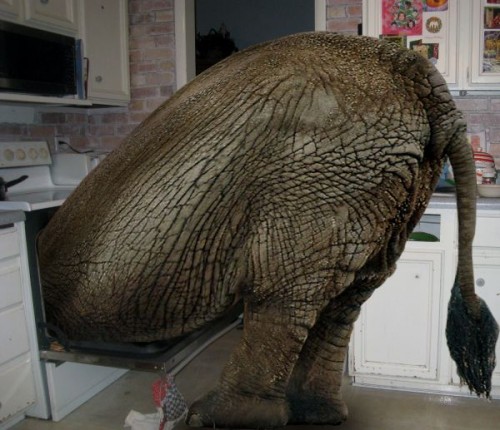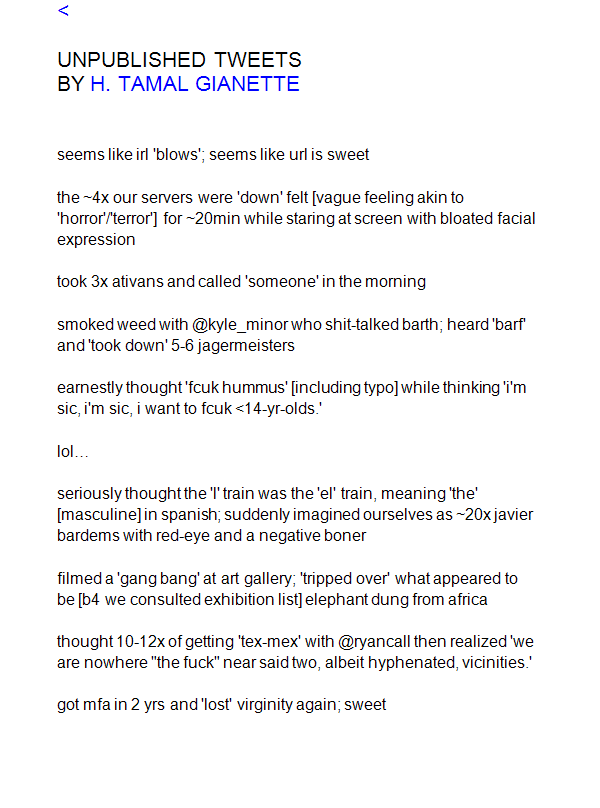4 things that sorta suck
11. Being a big fish in a small pond. It’s not the same anymore. Because you are going to meet the internets. And the internets is an ocean. So now you’re not a big fish.
2. Black Swan. Because you didn’t learn anything about the ballet world you didn’t know. Every non-ballet world reader here, if asked to write the screenplay, would have thought: Well…bulimia, fucked up toes and shoes, domineering director dude with European flair, bitchy colleagues, when you’re age thirty you’re done, skinny. Well, no shit. Oh, and I wish the director had never seen Sixth Sense. Oh, and ha-ha, the director laughs, the unreliable narrator is really mentally ill and I don’t really have a focus here and we need to prove Natalie really isn’t Queen Amidala so could you arch your back higher in those panties, etc.? I’m just happy he didn’t end it with “And then she awakes” which you know he did and loved in some outtake we’ll see later on DVD. Oh, and Winona Ryder is grossly miscast or possibly just medicated for Kleptomania/busy picking such a meaty, meaty role out of her eyeteeth. Oh and…and oh, fuck it.
1. That Sebald WG died at age 57. But these guys retraced his funk-gloom walk of The Rings of Saturn. This doesn’t suck, as you will see, but it sucks for me that we are doing retrospective ideas on a writer recently loved (by me, fer sure) alive and writing new words.
4. Wendy’s new fries. I’m getting a New Coke feel. It’s a conspiracy of suck to make us like their old fries. The new fries hold the brown of bundled mortgages and taste like a committee or cat litter or a committee of cat litters. Something to make you doubt your ways.
Occupation: Writer & the Myth of the Writer: Two Semi-Related Ideas Smashed into One Post
Thinking over Andrew’s post about his experience at New School’s MFA, I’ve been considering why I decided to become a writer.
Yesterday, for no reason at all, I remembered this conversation I had with a high school friend seven years ago, right before I started my MFA. He was on break from university (Columbia). We texted back and forth about meeting for a coffee. He said something ridiculous like: I can’t meet on Thursday until after 10 because I have to watch Grey’s Anatomy. When we finally did meet up, he told me something ridiculous like: I just love Grey’s Anatomy so much I’m going Pre-Med so I can have that experience. (And what’s not to want: beautiful doctors sexing each other up all day long and periodically doing some crazy cool, ground-breaking surgeries. I’m sold. Sign me up.)
I say it’s ridiculous, but how ridiculous is it? Why did you start writing? Why do any of us choose our occupations? How much of it has to do with popular media portrayals of certain occupations? (Yes, I realize this is a privileged position. I had a choice. Some people don’t have that choice. I don’t think this undermines my point though.)
I decided to become a writer because when I was eighteen, my college roommate was a poet and all the boys were crazy for her. Turns out they followed her around because she’s gorgeous, but lordy, I was convinced that if I became a writer, like her, I’d have boys trailing me too.
REMOVED
The New School asked that I take this down. They did say it violated confidentiality. They were extremely courteous and understanding about the post, its relevance, and my concerns. In short, I’m all good with them.
On the upside, we saw people writing a whole lot, which was my complaint in the first place. (jk)
Dear James Joyce,
Letter from Vladimir Dixon to James Joyce, February 9, 1929
Dear Mister Germ’s Choice,
In gutter dispear I am taking my pen toilet you know that, being Leyde up in bad with the prewailent distemper (I opened the window and in flew Enza), I have been reeding one half ter one other the numboars of ‘transition’ in witch are printed the severeall instorments of your ‘Work in Progress’.
You must not stink I am attempting to ridicul (de sac!) you or READ MORE >
being tired, being inspired
I came across this gem last night while I was not sleeping. I’m particularly interested in Mr. Tate’s idea of “writing out of exhaustion” — that writing while tired (either physically or mentally, I guess) can result in material interestingly distinct from writing written while one is “refreshed.” This seems to be the polar opposite of what Maggie Nelson expresses here (via here) — that periods of inactivity are somehow inherent or necessary to periods of activity. I don’t know… I feel like I see the merits of both. There are times when I’m particularly energized and times when I’m not, but I like to write through it all. How bout you guys: write to exhaustion or write through exhaustion? THOUGHTS?
What is Experimental Literature? {pt. 3}
In part one, I proposed that one way we might begin to think about experimental literature is in terms of open and closed texts, using Lyn Hejinian’s essay “The Rejection of Closure” as the jumping off point.
In part two, I used Brian Evenson’s remarks about the suffocating influence of “Aristotelian notions that still dominate most thinking about fiction in writing workshops today…Discussions of setting, plot, character, theme, and so on,” as an opening for thinking about the origin of convention, i.e. the counterpoint to works of experimental literature.
This time around, I want to use Ben Marcus’s recent interview to make some remarks about the differences between reading practices and writing practices in order to show how those two roles impact the creation and reception of experimental literature.
Deb Olin Unferth and the Double-I
 I make a portion of my living helping other people write, rewrite, fix, or otherwise fiddle with their memoirs. Generally speaking, these people are not interested in the Single-I point of view, or the “dispatch from the moment,” or a memoir proceeding entirely in a progression of chronologically linear scenes from the point of view of the person they were at the time of the events they’re offering the reader. The reason is usually a lack of desire for discipline — there are very few tasks more difficult than the task of writing a chronologically linear book in a progression of scenes which are not hijacked by a latter-day narrator who regularly swoops in to essay, explain, make meaning, apologize, or otherwise interrupt the experience the reader is having with the person the narrator used to be. The primary benefit of the Single-I is that it is the closest thing we have in memoir to the simulation of someone else’s experience of life, since life is lived in the moment to moment and offers little in the way of summary, dispatches from the future, and so on. All that comes later, when we impose narrative on past events. Narrative is one of my favorite things, but it is, let’s remember, a fundamentally artificial thing, different in almost every way from the actual experience of living life. All the boring stuff is cut out, all the everyday stuff is cut out, all the sleeping, most of the eating and pissing and pooping, most of the banalities of conversation, etc. (I should note here that the exception that points back to this rule is the craftsmanly recent fiction of Tao Lin, whose last two novels are very interested in restoring these banalities alongside the discipline of the Single-I, and toward interesting ends including reproduction of a kind of self-centered Americanized young person’s Buddhist-ish consciousness — but that’s not what I want to talk about here.)
I make a portion of my living helping other people write, rewrite, fix, or otherwise fiddle with their memoirs. Generally speaking, these people are not interested in the Single-I point of view, or the “dispatch from the moment,” or a memoir proceeding entirely in a progression of chronologically linear scenes from the point of view of the person they were at the time of the events they’re offering the reader. The reason is usually a lack of desire for discipline — there are very few tasks more difficult than the task of writing a chronologically linear book in a progression of scenes which are not hijacked by a latter-day narrator who regularly swoops in to essay, explain, make meaning, apologize, or otherwise interrupt the experience the reader is having with the person the narrator used to be. The primary benefit of the Single-I is that it is the closest thing we have in memoir to the simulation of someone else’s experience of life, since life is lived in the moment to moment and offers little in the way of summary, dispatches from the future, and so on. All that comes later, when we impose narrative on past events. Narrative is one of my favorite things, but it is, let’s remember, a fundamentally artificial thing, different in almost every way from the actual experience of living life. All the boring stuff is cut out, all the everyday stuff is cut out, all the sleeping, most of the eating and pissing and pooping, most of the banalities of conversation, etc. (I should note here that the exception that points back to this rule is the craftsmanly recent fiction of Tao Lin, whose last two novels are very interested in restoring these banalities alongside the discipline of the Single-I, and toward interesting ends including reproduction of a kind of self-centered Americanized young person’s Buddhist-ish consciousness — but that’s not what I want to talk about here.)
What I want to talk about is a brief passage from Deb Olin Unferth’s new memoir Revolution: The Year I Fell in Love and Went to Join the War, a book that decidedly rejects the Single-I point of view in favor of the much more popular alternative, the Double-I. (This terminology is not standard, by the way. I borrow it from my old teacher Lee K. Abbott. I have found it very useful for descriptive reasons, so I’m going to keep using it.) READ MORE >
Seminar in Sentence-Making #36: Nabokov Edition
 This is from Chapter Two, Part 4, of Vladimir Nabokov’s Pnin. The protagonist, immigrant professor Timofey Pnin, has just had all his teeth pulled:
This is from Chapter Two, Part 4, of Vladimir Nabokov’s Pnin. The protagonist, immigrant professor Timofey Pnin, has just had all his teeth pulled:
A warm flow of pain was gradually replacing the ice and wood of the anaesthetic in his thawing, still half-dead, abominably martyred mouth. After that, during a few days he was in mourning for an intimate part of himself. It surprised him to realize how fond he had been of his teeth. His tongue, a fat sleek seal, used to flop and slide so happily among the familiar rocks, checking the contours of a battered but still secure kingdom, plunging from cave to cove, climbing this jag, nuzzling that notch, finding a shred of sweet seaweed in the same old cleft; but now not a landmark remained, and all there existed was a great dark wound, a terra incognita of gums which dread and disgust forbade one to investigate. And when the plates were thrust in, it was like a poor fossil skull being fitted with the grinning jaws of a perfect stranger.
The first thing I notice is that the description isn’t static. It is wedded to narration in the forward motion of time. READ MORE >



